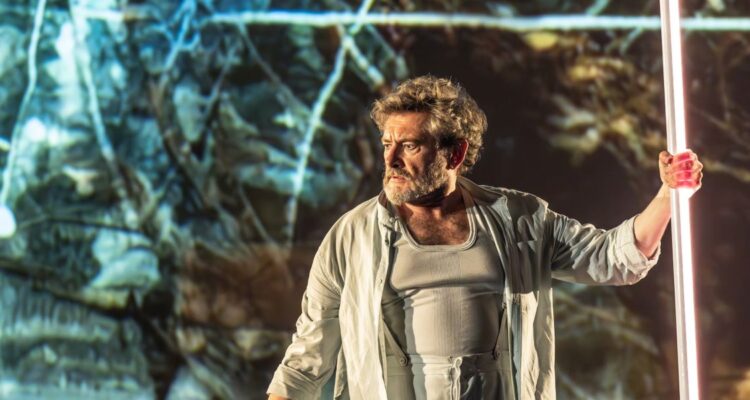Anthony Bolton’s first opera on the death of Alexander Litvinenko made a powerful impression at Grange Park Opera a few years ago, and now he returns with a work adapted from Shakespeare’s The Tempest. This take on Shakespeare is very different from that of Thomas Ades, and is both free and strict in its criteria. It is free in the sense that some scenes are omitted and the action is condensed, but it is strict in the sense that it is Shakespeare’s original text that is set to music, and not someone else’s paraphrase. This is itself a high ambition, which few composers have followed with success, and the example of Britten in A Midsummer’s Dream has clearly acted as an inspiration and model here.
The music is continuously effective rather than memorable. In that sense it rather reminded me of Jake Heggie’s Dead Man Walking. You do not carry away tunes in your head, but instead a sense that the music has encapsulated and realised the dramatic potential of each scene. The music is clearly technically demanding but is not inaccessible. Whether in solo arioso form or traditional trio or sextet, emotions are concentrated and enhanced with skill. Moreover there is a varied palette of colours in the orchestra, with plenty of inventive percussion effects and a ‘magic carpet’ interlude where the Gascoigne Orchestra get to express their own flair under the baton of George Jackson.
The vocal roles are well performed. Brett Polegato has a lot to do as Prospero, and he sings and acts with polish and command throughout. You have every sense of a man who rules his island and has a potential for both humanity and menace that could go either way. As the two lovers, Miranda and Ferdinand, Ffion Edwards and Luis Gomes have some demandingly high lines to deliver, which they do without apparent effort, and credible acting to boot. The part of Ariel is taken by a counter-tenor, Hugh Cutting, a role that seems again to echo Britten. The vocal writing and the instrumentation around it inspires Bolton to some of the best inspirations in the opera, and all the scenes involving Ariel command attention.
I wish I could say the same about the supposedly humorous sub-plot involving Caliban, Stefano and Trinculo, which always strikes me as tiresome, laboured and banal in the original, and which fares no better here despite the best efforts of the singers involved. Where the opera and the creative team excel though, is in the use of video technology to evoke the magical character of Prospero’s island, and that deserves a special mention, not least for its broader implications for operatic productions of the future.
Director David Pountney has teamed up with video specialist David Haneke to dispense with an orthodox set and replace it instead with three projection panels which present views of locations on the island, whether idyllic or desolate, as needed. The originality lies in having two of the panels on moving trucks rather than in fixed position so as to give a sense of depth and three-dimensional perspective enhanced by a suitable soundtrack as needed (for example, the gentle unfurling of surf that begins and ends the work). This functions very well as a means of suggesting the magical properties of the island, though the stage hands moving the panels around were all-too-visible either side of the screens. Just as AI has implications for the world of work and study, with which we are only beginning to grapple, so, in the same way, video projection and opera have a long future together which we are only just begininng to work through.
So for all sorts of reasons, both within the opera and surrounding it, this was a fully absorbing evening that left the audience with much to ponder at the end of the season at West Horsley.
Music: Anthony Bolton
Libretto: Anthony Bolton & R.D.Hamilton, adapted from Shakespeare
Director: David Pountney
Conductor: George Jackson
Cast includes: Hugh Cutting, Ffion Edwards, Luis Gomes, Andreas Jankowitch, Brett Polegato, Richard Suart, Adrian Thompson
Until 13 July 2024
3 hrs 30 mins with dinner interval
Photo Credit: Marc Brenner

